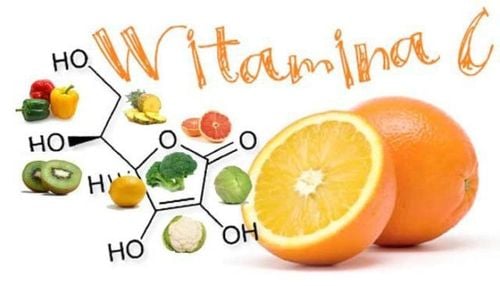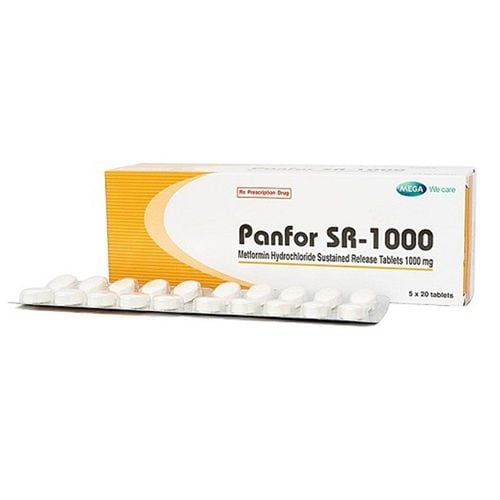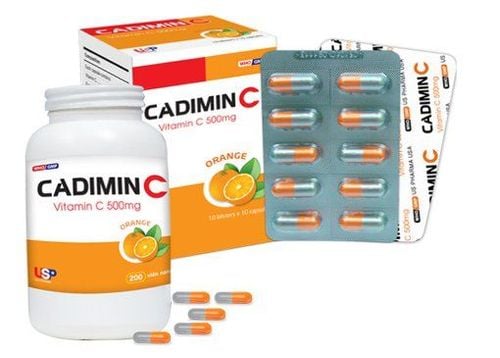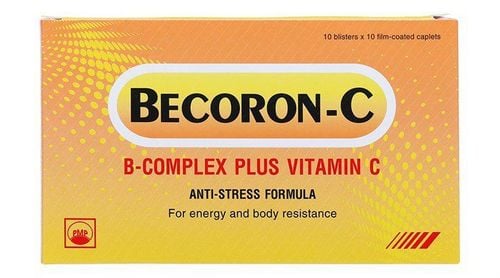This is an automatically translated article.
Adequate dietary vitamin C intake as recommended is beneficial for the cellular functions of both the innate and adaptive immune systems. Despite being a potent antioxidant that protects the body against endogenous and exogenous oxidative challenges, vitamin C's ability to act as a cofactor for many biosynthetic and gene-regulating enzymes helps to immune regulation.1. What is Vitamin C?
Vitamin C is an essential micronutrient for humans, with versatile functions related to its ability to donate electrons. It is a potent antioxidant and a cofactor for a family of enzymes that regulate biosynthesis and genes.2. What is the role of vitamin C in the immune system?
The immune system is a complex and multifaceted network of organs, tissues, cells, proteins, and specialized chemicals that has evolved to protect the host from a wide range of pathogens, such as bacteria, viruses, fungi and parasites. It can be divided into epithelial barriers, cellular and humoral components of innate (nonspecific) and acquired (specific) immunity. These components interact in many and very complex ways.Vitamin C contributes to the protection and enhancement of the immune system by supporting various cellular functions of both the innate and adaptive immune systems. Vitamin C supports epithelial barrier function against pathogens and promotes oxidant scavenging activity of the skin, thereby potentially providing protection against environmental oxidative stress.
Vitamin C accumulates in phagocytic cells, such as neutrophils, and can enhance chemotaxis, phagocytosis, generation of reactive oxygen species, and ultimately destruction of microorganisms. It is also required for apoptosis and the release of spent neutrophils from sites infected by macrophages, thereby reducing necrosis and potential tissue damage.
The role of vitamin C in lymphocytes is less clear, but it has been shown to enhance B and T cell differentiation and proliferation, possibly due to its gene-regulatory effects. it.
For infection prevention, dietary vitamin C should be adequate, if unsaturated plasma concentrations (ie 100–200 mg/day), which optimize cellular and tissue levels. In contrast, treatment of established infections requires significantly higher doses of vitamins (grams) to compensate for the increased inflammatory response and metabolic demands.

Chế độ ăn uống vitamin C đầy đủ có vai trò quan trọng đối với hệ miễn dịch của cơ thể
3. Effects on the immune system when not eating enough vitamin C
Severe vitamin C deficiency leads to potentially fatal scurvy. Scurvy is characterized by impairment of collagenous structures, leading to poor wound healing and impaired immune system. People with scurvy are very susceptible to potentially fatal infections such as pneumonia. Conversely, infection can significantly affect vitamin C levels by enhancing inflammation and metabolic requirements. It has been recognized from the outset that scurvy is frequently associated with infectious outbreaks in populations, and cases of scurvy have been reported following respiratory infections. This is especially evident for people who are already malnourished.Although the amount of vitamin C needed to prevent scurvy is relatively low (ie ~10 mg/day), the recommended dietary intake of vitamin C is 100 times higher than many other vitamins . A diet providing 100–200 mg/day of vitamin C is sufficient to saturate plasma concentrations in healthy individuals and should meet the general requirements for reducing chronic disease risk.
Due to the low storage capacity of the body for water-soluble vitamins, an adequate and regular supply is necessary to prevent anemia of C. Epidemiological studies have shown that vitamin C deficiency (vitamin C) in plasma <23 μmol/L) is relatively common. There are a number of reasons why dietary recommendations for vitamin C are not being met, even in countries where food is readily available and supplies are expected to be adequate. These include poor dietary habits, life stages and lifestyles that limit intake or increase micronutrient requirements (eg, smoking and alcohol or drug abuse), various diseases , exposure to pollutants and tobacco smoke (both active and passive) and economic reasons (poor socioeconomic status and limited access to nutritious food).
Even 'healthy' people in industrialized countries may be at risk due to lifestyle-related factors, such as those who diet or eat an unbalanced diet and people facing periods of excessive physical or psychological stress.
Vitamin C has a number of activities that may contribute to its immunomodulatory effects. It is a highly effective antioxidant, due to its ability to readily donate electrons, thereby protecting important biomolecules (proteins, lipids, carbohydrates and nucleic acids) from damage by substances Oxidative stress is produced during normal cellular metabolism and through exposure to toxins and pollutants (eg, cigarette smoke).
Vitamin C is also a cofactor for a family of monooxygenase and dioxygenase enzymes that regulate biology and genes. The vitamin has long been known as a cofactor for the lysyl and prolyl hydroxylases required to stabilize the tertiary structure of collagen and as a cofactor for two hydroxylases involved in carnitine biosynthesis, a molecule required essential for transporting fatty acids into mitochondria for metabolic energy.

Uống vitamin C giúp bảo vệ và tăng hệ miễn dịch
4. How to supplement zinc with vitamin C?
When the body wants to supplement zinc, you can use many foods to supplement it. Currently, there are many functional foods in the form of zinc salts such as zinc sulfate, gluconate, and acetate, which are the best sources of zinc supplements for the body. Dosage concentration needs to consult a specialist.Nutritionists recommend taking zinc together with vitamin C to enhance zinc absorption and strengthen the immune system and resistance to the human body.
In addition to using functional foods, many foods such as oysters, shrimp, crabs... meats such as beef, goat and vegetable products also contain a lot of zinc.
Because zinc does not exist in the body for a long time, take a daily supplement for a good immune system. However, should take zinc together with vitamin C to enhance zinc absorption, immune system and resistance for the human body.













